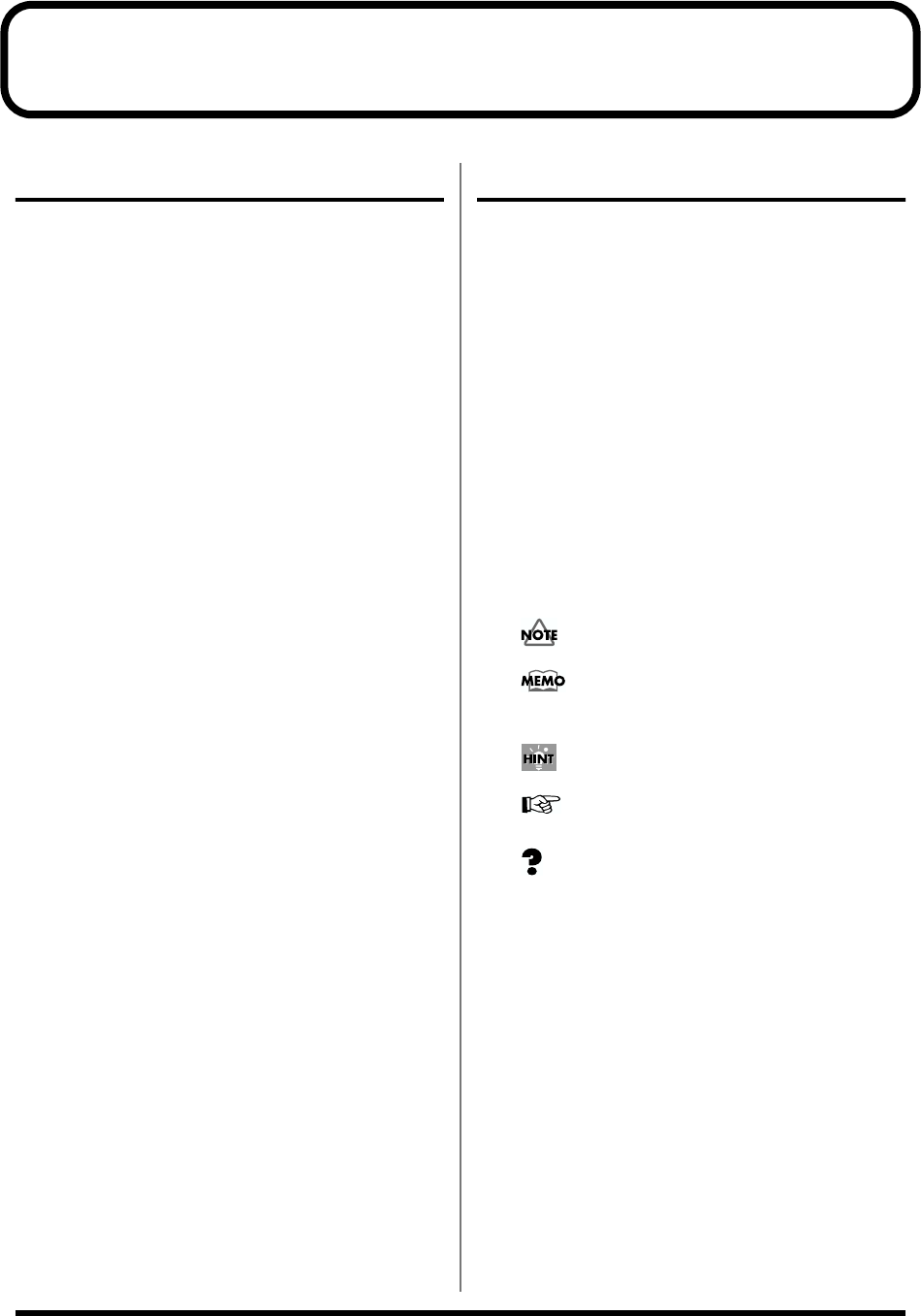
14
How to Use This Manual
Composition of This Manual
This owner’s manual is organized as follows.
Setup Guide (p. 15)
For those using the TD-6 for the first time, this volume explains the
preparations needed for playing sounds, including how to set up
the stand, make pad settings, and turn on the TD-6’s power.
Also provided are explanations of how to combine the TD-6
with other optional pads for fullest utilization of the TD-6’s
features and functions.
Quick Start (p. 41)
This contains descriptions explaining how to easily enjoy
performing with the TD-6’s numerous internal drum kits and
Preset songs.
Advanced Use (p. 55)
The TD-6 allows you use the drum kits you like to create new drum
kits and to create songs from recordings of what you play.
This section provides detailed explanations of all of the TD-6’s
functions.
• Chapter 1 Functions For Creating Drum Kits (p. 56)
Here are the settings used for creating sounds.
• Chapter 2 Functions For Correctly Performing with
the Pads (p. 71)
This describes the settings you need to make in order to
get the most expression from the TD-6 and pads.
• Chapter 3 TD-6 Settings (p. 77)
Included in this section are settings such as display
contrast and song volume that are applied to the TD-6
as a whole.
• Chapters 4–6 Using the sequencer and related
functions (p. 80)
Found here are metronome (click) settings, as well as
song performance, recording, editing, and other settings
for sequencers.
• Chapters 7–8 MIDI Settings and Examples of How
MIDI Is Used (p. 96)
This chapter explains how to use MIDI —whether it be
for saving data to an external device, or for using the
TD-6 as a General MIDI sound module.
Appendices (p. 109)
If you run into problems, refer to “Troubleshooting” to make sure
that the settings are correct. If an error message appears during
operation, refer to “Messages and Error Messages” and take
appropriate action. This section also provides various lists, and the
MIDI implementation charts.
Terms Used in This Manual
• Button names are enclosed in square brackets “[ ],” as in
[KIT] button.
• (p. **) indicates a reference page.
• Steps in operations may be abbreviated as described
below.
[KIT] ➝ [EDIT]
1. Press [KIT].
2. Press [EDIT].
[SHIFT] + [KIT]
1. While holding down [SHIFT], press [KIT].
• The functions of some buttons, such as [EDIT (SETUP)],
change if pressed while [SHIFT] is held down; the
function that is enabled when [SHIFT] is held down is
shown in parentheses.
• Symbols appearing before the beginning of sentences in
the manual have the following meanings.
These indicate cautionary notes. Be sure to read
them.
These are memos containing information
regarding settings and functions. Read it as
necessary.
These are useful hints for operation. Read it as
necessary.
These point to reference information. Read it as
necessary.
These are descriptions of terminology. Read it as
necessary.
* The explanations in this manual include illustrations that depict
what should typically be shown by the display. Note, however, that
your unit may incorporate a newer, enhanced version of the system
(e.g., includes newer sounds), so what you actually see in the
display may not always match what appears in the manual.


















